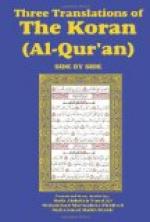6 The Resurrection, etc.
7 Abu Jahl had said: “Muhammad speaks truth, and he never said a falsehood; but, if the Banu Chosai, who enjoy already the offices of bearing the standard, of providing the pilgrims with water, and of keeping the keys of the Kaaba, should also obtain the Prophetship, what would remain for the other Koreisch.” Kashaf in 1.
8 See Sura lii. 38, p. 65. These passages may allude to the ladder set up in a tower by Wacih ben Salamah, one of the ancient doorkeepers of the Caaba, by which he professed to mount up to God and receive divine Oracles. Freyt. Einl. p. 371.
9 A community. Comp. Prov. xxx. 25, 26. Animals as well as mankind are under the control of God, are held within the limits of his decrees, are accountable to him, and will stand before him in the judgment.
10 Of the Eternal decrees.
11 Or, embellished, made it fair-seeming.
12 Lit. openly, i.e. preceded by some sign.
13 The Rabbins speak of the three keys in the hand of God. Tr. Tanith, fol. x.
14 On the preserved tablet, on which are written the decrees of God.
15 That is, during sleep. See Sura xxxix. 43, p. 258. Or, layeth to rest. Mar. renders literally, defungi faciet vos, id est, obdormiscere. Thus also Beidh. But see the use of the same word in the next verse.
16 Or, to perplex you (by dividing you into) sects.
17 Comp. Sura [cx.] 1x. 13.
18 Azar. This form is probably borrowed from Athar, as Terah is called by Eusebius. See Maracci Prodr. iv. 90. Compare a similar narrative (Midr. Rabbah on Gen. par. 17) in which Abraham is given over by his idolatrous father Zarah to Nimrod, who says, “We will adore the Fire:” “Rather,” said Abraham, “the water which puts out fire.” “The Water then"-"Rather the clouds that bear the water.” “The Clouds then"-"Rather the wind which scatters the clouds.” “The Wind then"-"Rather man who endures the wind.” Whereupon Abraham was thrown into the furnace. It is quite possible that in what follows, Muhammad may have intended to imply that Abraham had renounced the Sabian starworship of his fathers, and to vindicate him from the habit of consulting the stars attributed to him by the Talmudists. Shabbath, fol. 156, col. 1. “Abraham replied, I have consulted my Astrology.” Comp. Rashi on Gen. xv. 5. See Maim. Yad Hachaz. vii. 6.
19 Comp. Gen. xv. 5.
20 See Sura xxi. 52.
21 Lit. unless that my Lord shall will anything.
22 Or, confuse not their faith with wrong, injustice, i.e. idolatry.
23 Koran.
24 This verse and the following were probably added at Medina after the Hejira; at least it is difficult to conceive that Muhammad would have ventured thus to have written at Mecca.
25 This verse is said to have been revealed at Medina and to be aimed at the false prophets Moseilama, Aswad and Amsi; also at Abdallah Ibn Saad, Muhammad’s secretary, who for corrupting the sacred text and apostacy, was one of the ten proscribed at the taking of Mecca.




